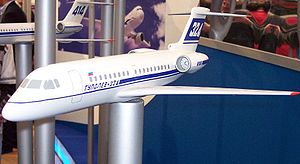This article needs to be updated. (April 2009) |
The Tupolev Tu-324 is a 30–50 seat regional jet passenger airliner. The jet will be twin-powered by Ivchenko-Progress AI-22 or Rolls-Royce BR710 turbofan engines. The plane will be available as a corporate plane for eight–ten executives. The range for the three aircraft variants will be 2,500 km, 5,000 km and 7,000 km. The cargo version can carry 3,000 kg of cargo and a range of 5,900 km is expected. The Tu-324 is designed to replace aging Yak-40, Tu-134, An-24 and An-26s on Russia's regional routes.
| Tupolev Tu-324 / Tu-414 | |
|---|---|

| |
| Tu-324 model | |
| Role | Jet airliner |
| Manufacturer | Tupolev |
| Status | In development, may be cancelled due to lack of funds. |
| Primary users | None None |
| Number built | 0 |
| Developed from | Tupolev Tu-134 |
Production
editThe executive version would be equipped with a satellite phone, FAX, and a PC outlet. The Tupolev Tu-324 would be able to operate from gravel and dirt airfields, providing safety and comfort of the passengers. The Tupolev Tu-324 would be produced at the S.P.Gorbunov Aircraft Production Association in Kazan, Russia. Estimated price is between $19–23 Million USD.
In recent years, despite politicians of the Tatarstan region fighting for the project,[1] only little progress was made as United Aircraft Corporation has focused on fostering the Sukhoi Superjet, Antonov An-148 and Irkut MC-21 projects instead. In 2016, manufacturing of the TU-324 was proposed among similar projects, but United Aircraft Corporation decided to restart production of the Ilyushin Il-114 instead.[2]
Variants
edit- Tu-324
- Tu-414
Specifications (proposed)
editData from [citation needed]
General characteristics
- Crew: 2
- Capacity: 30–50 passengers
- Length: 26.2 m (85 ft 11 in)
- Wingspan: 23.7 m (77 ft 9 in)
- Height: 7.3 m (23 ft 11 in)
- Gross weight: 24,630 kg (54,300 lb)
- Powerplant: 2 × Ivchenko-Progress AI-22 or Rolls-Royce BR710 or Soyuz R126M-300 turbofan engines
Performance
- Cruise speed: 800 km/h (500 mph, 430 kn)
- Range: 4,500 km (2,800 mi, 2,400 nmi)
See also
editReferences
edit- ^ Латыпов, Тимур (18 September 2015). "Ил-114 – это хорошо, но было бы лучше, если бы пошел Ту-324". БИЗНЕС Online (in Russian). Retrieved 2019-02-14.
- ^ Insider, Russian Aviation (2016-08-03). "UAC Confirms Final Assembly of Il-114 at Sokol plant". Russian Aviation Insider. Retrieved 2019-02-14.